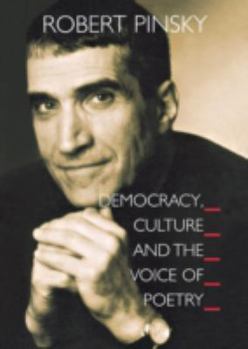Democracy, Culture and the Voice of Poetry
(Part of the The University Center for Human Values Series Series)
Select Format
Select Condition 
Book Overview
The place of poetry in modern democracy is no place, according to conventional wisdom. The poet, we hear, is a casualty of mass entertainment and prosaic public culture, banished to the artistic sidelines to compose variations on insipid themes for a dwindling audience. Robert Pinsky, however, argues that this gloomy diagnosis is as wrongheaded as it is familiar. Pinsky, whose remarkable career as a poet itself undermines the view, writes that...
Format:Paperback
Language:English
ISBN:0691122636
ISBN13:9780691122632
Release Date:March 2005
Publisher:Princeton University Press
Length:96 Pages
Weight:2.45 lbs.
Dimensions:0.4" x 4.2" x 7.2"
Customer Reviews
3 ratings
A century or two without poetry?
Published by Thriftbooks.com User , 15 years ago
In this elegant, clear and concise essay Pinsky explains why modern poetry is generally ignored in America; as a poet, he faults society instead of the poets. The poetry he praises is a "peculiar blend of ballad and tragedy, meditation and gossip" which resists "any anticipation to make American poetry something that goes down easily." He praises 'Eros Turannos' by Edwin Robinson, a 1911 poem describing the empty feelings of a woman in a bleak marriage; he condemns 'Chicago' by Carl Sandburg in 1916 which fails "to equal 'Eros Turannos' in emotion, in formal penetration or invention." Presumably, on this basis, a man can know and express the innermost feelings of a woman who knows how "all her doubts of what he says/Are dimmed with what she knows of days --/". Yet, Sandburg is deemed incapable of expressing the dynamism of Chicago which is still "Laughing the stormy, husky, brawling laughter of Youth, half-naked, sweating, proud to be Hog Butcher ...." If you agree poetry is articulate tragedy in a few words, you'll love this essay which demolishes everything but sorrow, despair and grief. Pinsky is an astute thinker, scholar and writer who illustrates his theme with references from Alexis de Tocqueville to Rabindranath Tagore. If you want reality, try Robert Service and 'The Cremation of Sam McGee' from 1907, or John Gillespie Magee Jr. and 'High Flight' from 1941, or Lt. Col. Robert McCrae and 'In Flanders Fields' from 1918. Most definitely read Carl Sandburg and 'Chicago' again or even for the first time. Obviously, my opinion is an "equatorial opposite" to Pinsky; a contrast between a dynamic hot, sweaty, messy mirth to that of Pinsky's pure cold crystal clear gloom. If you share Pinsky's view, this book is great; if you don't and wonder why poetry is so vigorously unappreciated in America, it explains much. Of far more serious concern, which remains sadly unanswered except to claim America today is rudely uncultured, what has been written within the past century to rival 'Chicago' or 'Eros Turannos'? As is said in Chicago of the beloved Cubs, "any team can have a bad century." Perhaps any society can have a bad century without significant poetry.
Important Statement about the place of poetry in America
Published by Thriftbooks.com User , 18 years ago
Poetry is not aristocratic in America--but rather personal and cultural at the same time. Pinsky jumps right into the discussion of culture and the so called "culture wars," and shows us all the many ways in which our poetry is a public expression of deep knowing and the inner voice. His takeoff point is Alexis de Tocqueville's description of American life as lacking in poetic quality in Democracy in America. Americans, Tocqueville maintains, will focus not on the heroic actions of aristocratic poetry, but on the natural features of the landscape and the interior feelings, emotions and makeup of the individual person. Pinsky sees this observation as prescient of what our poetry eventually has turned out to be. He sees America's poetry as a poetry of shared memory--shared and socialized through the human voice. The human voice of the poem as read aloud is the actual instrument, for Pinsky, of culture--making men and women social beings. This, of course, is the genius of Pinsky's Favorite Poem Project, which has generated two anthologies to date and a video archive of the social moments of America's poetic voices as brought to life by ordinary Americans. He provides special insights into the "skewed quatrains and secular hymns" of Emily Dickinson (one of my favorite poets)and Walt Whitman's project (partly a failure and partly a success) to fashion himself into the persona of a great national bard. This is one of the best descriptions of poetic "voice" that you will ever find. Pinsky himself has the credentials for it, given his own remarkable body of poems, his translations of Dante's Inferno and now his new book on David--perhaps one of the greatest models for all poetry. If you write or read poetry, this is a book you will resonate with.
A great short read
Published by Thriftbooks.com User , 21 years ago
Short, punchy, and nicely designed. Pinsky doesn't waste words. If you want to read a modern manifesto in defence of poetry, this is it. It's easy to dump on Pinsky because he's in the public eye so much, but this at least shows he's there because he has a brain. And who can complain about a poet being a star?




